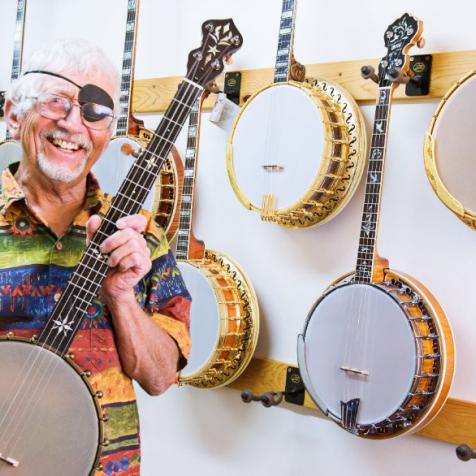
Company Details
Location
Boulder
Founded
1970
Ownership Type
Private
Employees
5
Products
Banjos
Boulder, Colorado
Founded: 1970
Privately owned
Employees: 5
Industry: Consumer & Lifestyle
Products: Banjos
Chuck Ogsbury's legendary banjo business continues to hit high notes, though cheap competition and a shrinking pool of craftspeople are cause to fret.
Chuck Ogsbury has been called the Stradivarius of the banjo. He and his team have made more than 6,000 banjos since starting OME in 1970.
What separates a mass-produced banjo from an OME Banjo? "Attention to detail all the way through," says Ogsbury. "We do a lot of hand work."
That's a bit of an understatement. An OME Banjo is a musical work of art, from the nickel-silver frets and gold-plated parts to the custom drumhead and handmade bridge.

OME has a 10-year stock of air-cured wood (Ogsbury favors South American mahogany, North American walnut, and Indian rosewood), a year-long backlog on retailer orders, and a banjo catalog that has changed with the times.
Starting in the 1960s, that meant bluegrass banjos, with a heavier tone ring than folk-oriented banjos. More recently, five-string banjos favored by Dixieland jazz musicians 60 years ago have made a comeback.
"There's a ton of younger bands playing the banjo," says Ogsbury, highlighting Mumford & Sons and the Avett Brothers as standout newcomers leading the revival.
The OME team ships banjos to Japan, Europe, and Canada, but the U.S. represents more than 90 percent of OME's market.

"We've gotten better at it," he says. "We've added computerized milling."
But there's an elusive quality to making musical instruments that only comes with experience, and Ogsbury and his colleagues at OME have more than 90 years of it.
"Sound is still a big mystery," says Ogsbury. "This happens a lot: You try to design something for one thing and it works for another thing. Sound is really a hit-or-miss, magical thing."
Challenges: Finding skilled craftspeople. "This area, especially Boulder, it used to be a lot more laid-back and craftsmen were easy to get," laments Ogsbury. "It's really different now. It takes a good seven years to get good at what they do. Today in Boulder, people want to make big money quick. I'd like to get one or two more younger guys to carry on the tradition."

What kind of person is he looking for? "Banjo-makers tend to be quirky individuals and they tend to be hands-on individuals."
Opportunities: "I'm just hoping to keep it going," says Ogsbury. Cheap Asian banjos "have destroyed the lower end of the market."
"Over in Asia, they're paying $1 an hour," he adds. "I'm paying my top guys $25 an hour. It's a world economy, but it's destroying manufacturing over here."
Besides making banjos, he also has developed industrial parks in Louisville. "They can't import buildings from China yet."
Needs: Regulatory reform, namely modernizing the Lacey Act banning "illegal” wood and other plants and animals. "They're making it so damn difficult," says Ogsbury. "It's really hard for somebody in my position."

